Disability Services Commissioner (DSC) has been able to collect valuable long-term data and analyse trends and themes in complaints made about disability services. Identifying themes and trends can help DSC and the disability sector pinpoint areas that clearly need improvement and promote and protect the rights of people with disability. To this end, we have published three Occasional Papers, one data paper based on data collected by DSC and the findings from a research project, Building Safe and Respectful Cultures.
Occasional Paper No. 3, Learning from reviews of Victorian disability service provision to people who have died 2017 to 2021 – A reflection for future safeguarding.

Front cover of Occasional paper number three
This report provides an overview of the lessons learnt from more than three years of reviewing disability service provision to people who have died.
Reviewing and investigating these services at the time of a person’s death provides a significant insight into their life, and their personal story. Our reviews tell us that some people do live good lives, and their disability services enhance and empower them to engage meaningfully in all aspects of their community. However, while some people’s deaths may be ‘expected’, the quality of service provision may not have been good enough. Sadly, the majority of deaths we review are ‘unexpected’ and raise significant concerns about the quality of service provision, possible preventable early deaths, and teach us that oversight and action must continue to be taken on both an individual and system-wide level.
In reviewing and investigating deaths, the DSC has learnt significant lessons regarding what we have done well, what we would do differently, opportunities we have missed, and opportunities and risks for the future.
Download Occasional Paper No. 3 in PDF (902 KB) or RTF (22,466 KB).
Research Project: Building safe and respectful cultures
 The Building Safe and Respectful Cultures pilot project aimed to learn more about the culture of services for people with disability and identify some practical approaches that might be both useful now and relevant for future development.
The Building Safe and Respectful Cultures pilot project aimed to learn more about the culture of services for people with disability and identify some practical approaches that might be both useful now and relevant for future development.
Safety and respect are abstract concepts, and it is difficult for people to respond to questions posed directly about either
‘safety’ or ‘respect’. For this reason, all the people participating in interviews and focus groups were asked to share the ways that they understood the related core concepts of care and support, safety, choice and decision making, and problem solving.
This report and further information is available on the project page.
Data paper: Disability services complaints data

Disability services complaints data (2007-15): What have we learnt so far? April 2017.
When DSC was established in 2007 it was clear that many people with a disability experienced significant barriers to making complaints about their experiences with disability services. Those barriers included limited communication, a fear of retribution and an acceptance of the status quo.
Eight years of complaints data collected from Victorian disability service providers via the Annual Complaints Reporting (ACR) process has been used to inform this paper which focuses on complaints made directly to service providers – over 12,000 complaints – between 1 July 2007 and 30 June 2015.
We have seen growing confidence in people with a disability, their families and carers to make complaints about their disability services. Many more people are speaking up now than in 2007. Service providers are increasingly recognising the benefits of proactive and sensitive complaints handling.
Download complaints data paper in PDF (3.9MB) and RTF (6MB).
Occasional Paper No. 2, Learning from complaints
 Families and service providers working together: Developing policy principles and strategies to support families of adults with a disability and disability service providers to work more effectively together. February 2014.
Families and service providers working together: Developing policy principles and strategies to support families of adults with a disability and disability service providers to work more effectively together. February 2014.
This paper addresses the issue of families of adults with a disability and service providers working together. A consistent theme in the work of DSC has been the resolution of complaints that have arisen from a lack of consultation and agreement between families and service providers.
This paper details learnings from DSC’s own experience of complaints and incidents and proposes policy principles that can form an effective foundation for achieving constructive engagement between the families of adults with a disability and disability service providers.
Download Occasional Paper No. 2 in PDF (2MB) or RTF (245KB).
Occasional Paper No. 1, Learning from complaints
 Safeguarding People’s Right to be Free from Abuse: Key considerations for preventing and responding to alleged staff to client abuse in disability services. June 2012.
Safeguarding People’s Right to be Free from Abuse: Key considerations for preventing and responding to alleged staff to client abuse in disability services. June 2012.
This paper deals with one of the most disturbing of issues which can occur in disability service provision, namely alleged assaults or abuse of clients by staff entrusted to provide care and support. These incidents adversely affect not only those directly involved, but also the confidence of other clients, families and staff in relation to the disability service system.
This paper reviews key considerations on this topic from literature and research, details learnings from DSC’s own experience of complaints and incidents and offers a number of strategies for consideration in protecting and safeguarding people’s right to be free from abuse.
Download Occasional Paper No. 1 in PDF (273KB) or RTF (376KB).

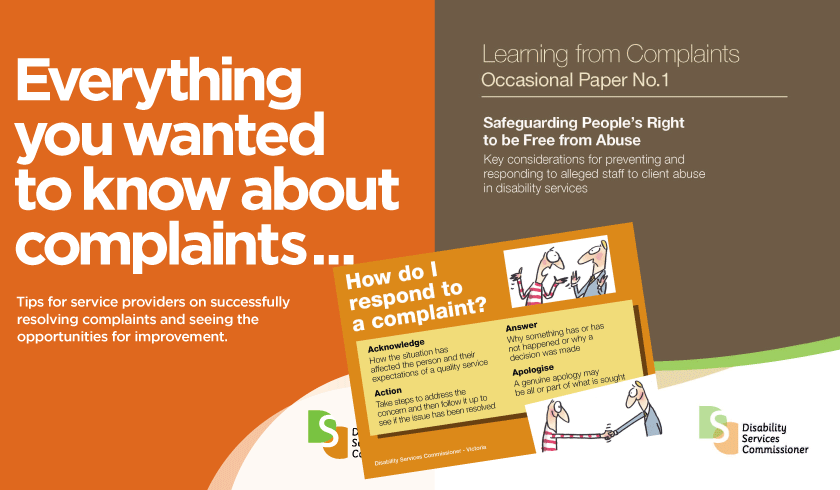
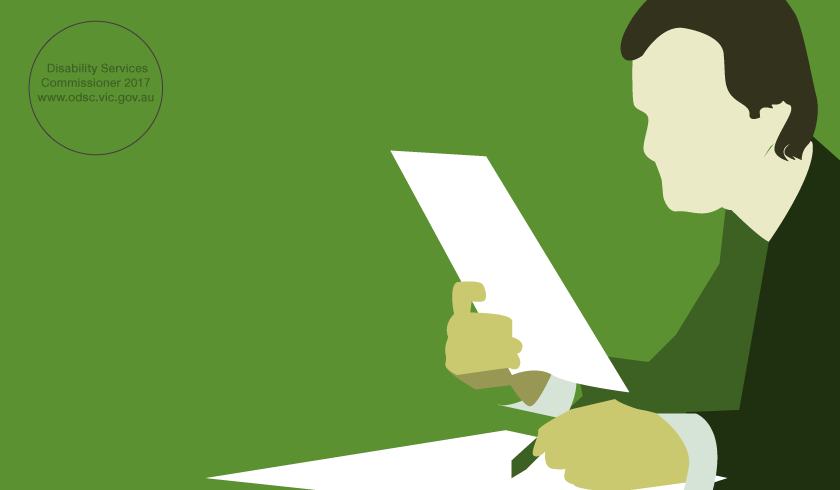






 Families and service providers working together: Developing policy principles and strategies to support families of adults with a disability and disability service providers to work more effectively together. February 2014.
Families and service providers working together: Developing policy principles and strategies to support families of adults with a disability and disability service providers to work more effectively together. February 2014. Safeguarding People’s Right to be Free from Abuse: Key considerations for preventing and responding to alleged staff to client abuse in disability services. June 2012.
Safeguarding People’s Right to be Free from Abuse: Key considerations for preventing and responding to alleged staff to client abuse in disability services. June 2012.





